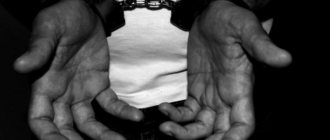ST 124 of the Criminal Code of the Russian Federation.
1. Failure to provide assistance to a patient without good reason by a person obligated to provide it in accordance with the law or with a special rule, if this resulted through negligence in causing moderate harm to the health of the patient, is punishable by a fine in the amount of up to forty thousand rubles or in the amount of wages or other income of the convicted person for a period of up to three months, or compulsory work for a period of up to three hundred and sixty hours, or correctional labor for a period of up to one year, or arrest for a period of up to four months.
2. The same act, if by negligence it entailed the death of a patient or the infliction of grievous harm to his health, is punishable by forced labor for a term of up to four years with deprivation of the right to hold certain positions or engage in certain activities for a term of up to three years or without it, or by imprisonment. for a term of up to four years with or without deprivation of the right to hold certain positions or engage in certain activities for a term of up to three years.
Everyone should know
The official Internet portal of legal information contains the Rules of Conduct, which are mandatory for citizens and organizations when introducing a high alert regime or emergency situation (approved by Decree of the Government of the Russian Federation dated April 2, 2020 No. 417).
Everyone needs to know these rules, as they apply during periods of emergency and high alert. It was the high alert regime during the pandemic that was introduced by a number of acts of regional authorities (for example, decree of the mayor of Moscow No. 12-UM dated 03/05/2020, as amended by 39-UM dated 04/04/2020, decree of the governor of the Magadan region dated March 18, 2021 No. 44-u).
In this note I will not write much about the content of the Rules, and not all of them relate to the current situation with covid-19. I recommend that readers independently read the text posted at this link.
Analysis of crime from a medical point of view.
The concept of “sick” and “patient”.
In the current legislation there is no concept of “sick”; the closest concept named in the Law “On the Provision of Medical Care” is the concept of “patient”. In accordance with the law, a patient is considered an individual who has applied to a medical institution for medical care, regardless of whether he has a certain condition or disease, or a person who is already receiving medical care .
It follows from this that, from a legal point of view, a person is recognized as a sick person (patient) if one of the conditions is present: • The individual is already receiving medical care in a medical organization. • An individual applied to a medical organization for medical care.
The concept of a “special rule”
The disposition of the article under consideration contains an indication of the so-called “special rule”, which imposes on the doctor the duties of providing assistance to the patient. What are we talking about in this case?
The Law “On Health Protection” contains an indication that health workers are obliged to provide medical care in accordance with their qualifications, service and job descriptions, and job descriptions (Article 73).
For example, the job description of a traumatologist states the following duty: “The doctor is obliged to provide medical care to all patients admitted to the emergency room.”
Another widely known informal rule, which states that a doctor is obliged to provide medical care to all patients, is the Hippocratic Oath. But in modern times, the Hippocratic Oath is not a promise to provide medical care to all patients, and certainly not a normative source or a special rule, but simply creates a positive image of the medical worker, giving him more sublimity.
Also, the Law “On Health Protection” contains the doctor’s oath, which states the promise to honestly fulfill one’s medical duty, to always be ready to provide medical care, to treat the patient with care, and to act in his interests. In essence, this oath is part of the student's rite of passage into the medical profession.
Failure to provide assistance to the victim
I will dwell in more detail on the responsibility displayed in the title of the publication. Indeed, if in ordinary life only persons belonging to the categories directly specified in the law (police officers, Ministry of Emergency Situations, medical workers, etc.) are obliged to provide assistance to the victim, then according to paragraphs. “d” clause 3 of the Rules, citizens are obliged, upon discovering a victim, to take measures to call authorized officials and, before their arrival, in the absence of a threat to life and health, provide first aid to the victim.
Since the obligation to provide first aid during a state of emergency and high alert is assigned by a regulatory legal act to every citizen, evasion from providing such assistance constitutes a crime under Art. 125 of the Criminal Code of the Russian Federation “Leaving in danger.” The punishment under this article is up to 1 year in prison.
Commentary on Article 124 of the Criminal Code of the Russian Federation
1. The victim of a crime is a patient, i.e. a person suffering from any disease and in need of medical care. The type of disease and the stage of its course do not matter in terms of qualifications. It is important that the illness, if assistance is not provided, creates a real threat of harm to the health of the victim.
2. The objective side of failure to provide assistance to a patient includes elements characterizing the act (failure to provide assistance without good reason), the consequence (at least moderate harm to health) and the causal relationship between them.
3. Failure to provide assistance is expressed in inaction. There is an opinion that it can also be embodied in partial inaction (failure to take the entire range of medical measures, poor-quality treatment, etc.). This is unlikely to be true. The law distinguishes between the concepts of failure to provide assistance and improper performance by a person of his professional duties (Part 2 of Article 118), which cannot be ignored. Another question is that the sanctions of Art. 118 and 124 are not properly adjusted.
4. It is also not entirely clear whether Art. is talking about any type of assistance. 124 or only about urgent, primary, ambulance. The fundamentals of the legislation of the Russian Federation on protecting the health of citizens distinguish between primary, emergency, specialized and medical and social care (for citizens suffering from socially significant diseases and diseases that pose a danger to others).
According to Part 1 of Art. 41 of the Constitution, everyone has the right to medical care, which is provided to citizens free of charge in state and municipal health care institutions. Private clinics are known to provide paid services for certain types of medical care. In state and municipal institutions, some specialized services are now also provided on a paid basis.
Consequently, failure to provide assistance is considered refusal or evasion to provide urgent assistance, which creates a real threat of causing serious harm to the victim’s health.
5. In a specific case, failure to provide assistance may be expressed in the doctor’s refusal to accept a call or go to the house, accept an admitted patient or examine him. The perpetrator may refuse to perform artificial respiration, stop the bleeding, apply stitches, call an appropriate specialist in the field of the disease, give the necessary medications, fail to take measures to transport the victim in need to the hospital, etc.
6. The penalty for inaction, as is known, presupposes that the person should and could have acted.
The duty (obligation) to act follows from the requirements of the Fundamentals of Legislation of the Russian Federation on the protection of citizens' health (Articles 38 and 39), which states that primary and emergency medical care is provided to citizens in cases of injuries, poisoning and other emergency conditions by treatment and preventive institutions, regardless of territorial, departmental subordination and forms of ownership. The obligation to provide care to the patient is reinforced by the Hippocratic Oath, pronounced by a graduate of a medical school.
The ability to act (subjective criterion) is a prerequisite for responsibility. Not by chance in the comment. The article talks about failure to provide assistance without good reason. Valid reasons include those that are insurmountable at the time a specific obligation to act arises. They can be considered force majeure, a state of emergency, illness of the medical worker himself, lack of necessary tools, medications, etc.
7. Conditions that give rise to the obligation to act are the appeal of the patient, his relatives, other persons, as well as observation by the obligated person himself of a situation that causes the need to act (for example, he is a witness to a traffic accident with the presence of victims). As a rule, the patient's consent is required for medical intervention. In accordance with Art. 32 Fundamentals “a necessary precondition for medical intervention is the informed voluntary consent of the citizen.” At the same time, providing assistance without the consent of the patient (his relatives, legal representatives, etc.) is possible if for some reason consent cannot be obtained (for example, due to the comatose state of the victim), and medical intervention is urgently necessary.
8. The elements of the crime are constructed according to the material type. The crime is completed (by the elements) when at least moderate harm to health occurs. There has been a change in the legislative position on this issue: according to Art. 128 of the Criminal Code of the Russian Federation of the RSFSR, the very fact of failure to provide assistance to a patient without good reason was recognized as criminal. This seriously expanded the basis of the criminal code and led to the confusion of a crime and a disciplinary or immoral offense.
9. Causing harm to health of moderate severity is the minimum amount of harm, in the presence of which criminal liability is possible. If the failure to provide assistance caused only minor harm to health, criminal prosecution is excluded. A necessary element of a crime is a cause-and-effect relationship. The harm to health must be caused by the inaction of the perpetrator, his failure to provide assistance to the victim. If there is no such connection, the act cannot be qualified under Art. 124, even if both the act of failure to provide assistance and harmful consequences occurred. For example, after a paramedic refused to provide the necessary assistance, the patient decided to get to the district hospital on his own, but on the way he slipped, fell and received moderate injuries.
10. The subjects of a criminal attack are medical workers, as well as persons obliged to provide first aid by law or by special rule (Articles 38 and 39 of the Fundamentals). Medical workers should be understood as persons who professionally perform their functions (doctor, paramedic, nurse, midwife, pharmacist, etc.). Ancillary medical personnel (orderlies, nurses, laboratory assistants, registrars, etc.) are not subject to this crime and, under appropriate conditions, may be subject to criminal liability under Art. 125. Based on Art. 10 of the Law on Police, police officers are obliged to take urgent measures to save citizens and provide them with first aid. Failure to fulfill such an obligation may also be regarded as failure to provide assistance to the patient.
11. The subjective side of failure to provide assistance to a patient is characterized by a careless form of guilt: a person, refusing or avoiding providing assistance, foresees the possibility of causing harm to the patient’s health, but without sufficient grounds for this, arrogantly hopes to prevent such harm (for example, he hopes that help will be provided by another living nearby medical worker) or does not foresee the possibility of harm to health as a result of failure to provide assistance to the patient, although with the necessary care and forethought the onset of harm should and could have been foreseen (for example, the doctor refused to examine the patient, stating that, judging by the words of relatives, there was nothing wrong occurred; if the survey had been carried out, the outcome could have been different).
12. The widespread opinion that the analyzed crime involves a “double form of guilt” does not correspond to the law: intent in relation to inaction and carelessness in relation to the consequence. According to Art. 27, we can talk about a crime committed with two forms of guilt only in the case when the result of committing an intentional crime is grave consequences that enhance the criminal offense. We are, therefore, talking about qualified compounds. In relation to the main elements, one cannot speak of two forms of guilt, since the act in itself is not criminal. It may entail disciplinary, administrative or public liability.
Consequently, a crime is committed with a single form of guilt - through negligence. A conscious attitude towards failure to fulfill a professional duty has criminal legal significance, but only in terms of individualization of the criminal law and punishment.
13. If a person, without providing assistance to a patient, desires or consciously allows the occurrence of harmful consequences of his behavior (moderate or more serious harm to health), liability should not arise under Art. 124, and under other articles (105, 111, 112).
14. The criterion for differentiating punishment is the severity of the harm: Part 2 provides for increased punishability of careless infliction of serious harm to health or death of the victim.
15. The crime provided for in Part 1 is classified as minor, and Part 2 as moderate.
What follows from this in practice?
If you see a victim (not necessarily from coronavirus, but from any reason - traffic accident, electrical injury, drowning, fall, fainting, etc.), you must, at a minimum, call the police and an ambulance.
If there is no direct danger (for example, you do not need to cross a busy highway or enter a burning hut), you need to provide first aid to the victim - apply a splint, perform artificial respiration, turn your head to release vomit, remove the hanged person from the noose, move the power cable with an object, not conducting electricity, etc.
Ignorance of first aid methods and lack of medical education does not exempt you from the responsibility described above, so it is better to use a smartphone to search the Internet for information about first aid techniques, rather than to photograph the scene of the incident.
Please note that the high alert regime has not been introduced in all constituent entities of the Russian Federation. In those in which such a regime has not been introduced, the above rules do not apply.
Another comment on Art. 124 of the Criminal Code of the Russian Federation
1. The objective side of the crime is characterized by an act in the form of inaction (failure to provide assistance to a patient), a special situation in which the crime was committed (lack of valid reasons for failure to provide assistance), a consequence (causing moderate harm to the health of the patient) and a causal relationship between the socially dangerous act and the consequence. The crime is considered completed from the moment of causing moderate harm to the health of the patient.
2. By valid reasons that prevent the provision of care to a patient, it is customary to understand force majeure (collapses, floods, epidemics and other natural disasters), extreme necessity, illness of the doctor himself, physical or mental coercion. Establishment of a valid reason is made on a case-by-case basis.
3. The subjective side of the crime is characterized by a careless form of guilt in relation to causing moderate harm to health. Moreover, a careless form of guilt in the form of negligence is extremely rare, since medical workers, as a rule, foresee the consequences of failure to provide assistance to a patient.
4. Special subject - a person who has reached the age of 16 years, is obliged to provide assistance in accordance with the law, contract or special rule and has the opportunity to do this (see also Article 39 of the Fundamentals of the Legislation of the Russian Federation on the protection of the health of citizens of July 22, 1993 N 5487-1). In addition to doctors, the subjects of the crime include leaders of tourist groups, nurses, people specially allocated to provide medical care during tours, wintering, etc.
Can a medical worker go unpunished?
There are no certain types of medical care that cannot be provided with impunity. However, in each specific case, it is necessary to take into account what exactly the doctor (or a person equivalent to him) could have done, what exactly was done (or not done) - and what specific consequences occurred.
Interpretation of Art. 124 of the Criminal Code of the Russian Federation
In order for the actions of the perpetrator to be considered criminal, the following is required:
- The person was obliged to provide assistance.
- No help was provided, and there were no valid reasons.
- The result was dire consequences.
- There is a causal relationship between the inaction of the responsible person and the consequences.
Good reasons
In some cases, doctors' inaction will not be criminal. Each case is individual, and when considering the case, all significant factors must be taken into account, however, some typical situations can be identified when it comes to punishment under Art. 124 of the Criminal Code of the Russian Federation will not apply:
- External reasons. For example, if the ambulance was unable to arrive because the streets were flooded, this would relieve its employees from liability.
- Intervention by outsiders obstructing the provision of assistance. The classic case here is the situation with “HIV dissidents” or “refuseniks” who obstruct medical procedures on their children - and they end up dying.
- An urgent need. For example, if there is only one surgeon working in a medical institution, and two patients require urgent surgery at once, the doctor will not be responsible for the fact that one of them’s condition worsened or died due to delay. However, here it is necessary that the doctor first assess the condition of both and make an informed choice as to who should be given first aid.
- Lack of funds to provide assistance. For example, if the hospital physically does not have the required drug, the doctor will not be responsible for failing to administer it. Here we can only talk about the responsibility of the official whose duties included providing everything necessary.
- Incompetence of a doctor for a specific disease. However, you need to remember: the basics of first aid are included in the base of medical education, and all doctors, regardless of their specialty, should be able to provide it. If a doctor, incompetent in this matter, provided emergency assistance and called the necessary specialist, but he did not have time to arrive on time, there will be no talk of criminal liability.
Important! The list is indicative only. The court will ultimately decide which reason is considered valid.






